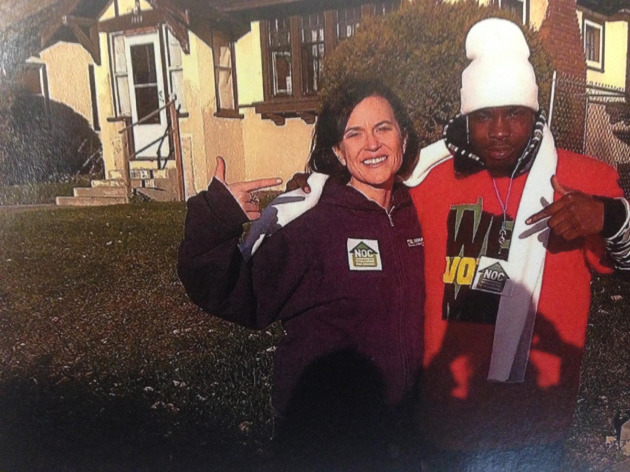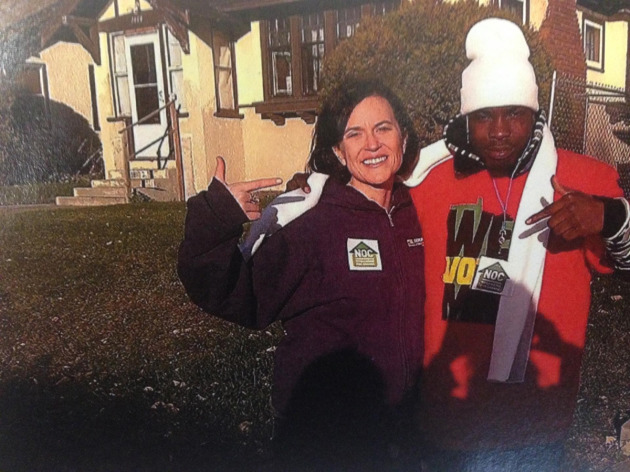Learning From the Absurdity of #Pointergate
By Isaac Butler
Pointergate may be the head-deskiest controversy involving negative stereotypes of Black men ever, but it’s worth paying attention to if you want to see how those stereotypes are used for political ends. If you haven’t heard about it—and you may not have, since it involves local news in Minnesota—here’s the basics: Betsy Hodges, the mayor of Minneapolis, was doing some politicking and took a photo with a constituent. The photo looked like this:
In case you can’t tell, that’s a photo of two human beings pointing at each other for the camera. The way human beings tend to do.
Here is the story Minneapolis local news KSTP ran on it. In case you don’t feel like clicking on the link, the headline, Mpls. Mayor Flashes Gang Sign with Convicted Felon; Law Enforcement Outraged, will give you some idea of the tenor of the coverage.
The “story” such as it was, swiftly fell apart. Video surfaced on YouTube of the picture being taken. The Mayor (like many other human beings) tends to point at people when her picture is taken with them, and there’s never been an outcry before. The Chief of Police was present during the taking of the photograph. The young man in question is far from the terrifying gang banger the depicted by KSTP. According to Nekima Levy-Pounds, writing in the Star-Tribune:
I learned that he has worked hard to reintegrate back into the community by being employed as a canvasser at Neighborhoods Organizing for Change (NOC) for the past two years. This young man personally knocked on thousands of doors during the election season to help get out the vote and educate community residents about the impacts of felon disenfranchisement in Minnesota.
As a young black man with a criminal history, he has experienced numerous challenges in attempting to successfully reintegrate back into society. Many of those challenges have occurred in his interactions with law enforcement in Minneapolis. He has been handcuffed and detained for things like spitting on the sidewalk and even arrested at a Cub Foods store on the Northside for registering people to vote. Last weekend, this same young man was part of a larger effort to engage in door knocking with members of NOC, the Mayor, and Chief Harteau. The photo in question was taken briefly during that effort.
Local television news, with its emphasis on crime reporting, plays a major role in perpetuating negative stereotypes about Black male criminality, even though most crimes are committed by whites. One study analyzing Los Angeles local tv news coverage found that, while Black people accounted for 21% of all people arrested, 37% of perpetrators featured on the news were Black. White people accounted for only 13% of homicide victims, yet were featured as victims 43% of the time. Studies in Chicago, Philadelphia and Pittsburgh have shown similar results.
If all that were going on here was a journalist looking to fill time on a slow news day with some slapdash reporting featuring negative stereotypes of Black men, that would be bad enough. But it appears there’s more going on to this story, as Citypages in Minneapolis reported:
In his report, Kolls said cops brought the photo to his attention after doing “investigative work” on Gordon’s Facebook page…. The whole story reeks of score settling, especially in light of Friday’s roll-out of police body cameras — an initiative championed by Hodges and which hurt more than a few feelings. John Delmonico, president of the city’s cop union, wrote an op-ed earlier this month in which he slammed the mayor for saying the culture of the police department was “on a downward spiral.” Kolls admitted on Soucheray’s show that Delmonico was among the cops who gave him the photograph.
It appears what is happening in Minneapolis, then, is not just the association of Black men with harmful stereotypes of criminality, but the leveraging of those stereotypes for the political ends. This is worth stressing, because what we’re seeing in Minneapolis is merely a ham fisted version of what happens all the time in American politics. Black men are associated with criminality (amongst other things), which in turn subconsciously reinforces fear of them. This fear is then used to provide motivation for more suspicious and punitive treatment, and to undermine support for the kind of public policies that would help not only Black men, but others as well.
In Minneapolis, this comes amidst quite a bit of national attention on the problem of police harassment of Black men and boys. Earlier this year, video surfaced of police arresting a Black man for the crime of sitting in a public space while waiting for his kids. As ThinkProgress reported, “African Americans in Minneapolis are 11.5 times more likely to be arrested for pot possession than whites in the city. This disparity is among the highest recorded by the ACLU, which gathered national data on marijuana arrests last year. Nationally, blacks are four times more likely to be arrested for marijuana than whites, even though they use pot at about the same rate.” Black kids, meanwhile, are 16.3 times more likely to be arrested for truancy and curfew violations.
By mandating body cameras, Mayor Hodges is taking steps to hold police accountable for misconduct. She also has a reputation as one of the only Mayors in Minneapolis history who will vigorously campaign in and speak to the African American residents of the poorer neighborhoods of North Minneapolis. Through associating her with “gang signs” and “convicted felons,” her opponents appear to be using that outreach to undermine her popularity with white voters, and to associate her accountability efforts with being “soft on crime.”
The dastardly truth is that people don’t have to even believe this gang sign malarkey for it to be effective. All that matters is that on some level in voters’ unconscious mind, the Mayor becomes associated with criminality. This is why it is vital that we speak out against the long-game tactics of Pointergate, rather than rationally and somberly explaining why the facts of the story are wrong. We must reveal Pointergate for what it is, a thinly-veiled attempt to use subconscious fears of African Americans to manipulate white voters in Minneapolis.


